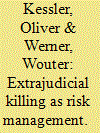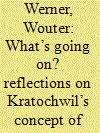|
|
|
Sort Order |
|
|
|
Items / Page
|
|
|
|
|
|
|
| Srl | Item |
| 1 |
ID:
081457


|
|
|
|
|
| Publication |
2008.
|
| Summary/Abstract |
This article analyses legal aspects of the `war on terror'. It argues that, by making recourse to a semantic of risk, danger and, in particular, precaution, the `war on terror' blurs crucial political and legal categories of public and private, of peace and war, of combatants and civilians, thus redefining the relationship between political responsibility, time and security. As a consequence, the extrajudicial killing of individuals becomes a form of risk management that takes place beyond established mechanisms of accountability.
|
|
|
|
|
|
|
|
|
|
|
|
|
|
|
|
| 2 |
ID:
161269


|
|
|
|
|
| Summary/Abstract |
The individualisation of punishment is a key element in liberal narratives about international law and international relations. This narrative has become an integral part of positive international law, especially the regimes governing the use of force and the prosecution of an international crimes. Rather than punishing states or entire societies, liberals claim, punishment has become restricted to those who incurred individual guilt. To liberals, the individualisation of punishment is part of a larger process of enlightenment and civilisation that has helped to fence atavisms like revenge. We do not question the emergence of an ever more sophisticated system of individual punishment in international law. However, we argue that punitivity has been more difficult to fully channel towards individuals and away from collectives than claimed. To be sure, punitive language has by and large been banned from the laws of armed conflict. We argue, however, that the absence of a punitive vocabulary does not equal the absence of punitivity. In contrast, current state practices of using armed force are still imbued with punitivity, however silenced in the current legal framework and thus pushed underground. Realising the presence of a punitive undercurrent, we argue, adds to a more comprehensive understanding of contemporary state practices.
|
|
|
|
|
|
|
|
|
|
|
|
|
|
|
|
| 3 |
ID:
144069


|
|
|
|
|
| Summary/Abstract |
This article focuses on two conceptual puzzles that arise out of Kratochwil’s concept of law. The first is the dual meaning of the questions ‘what is the law’ and ‘what is society’? I will argue that a sociological approach to these questions is unable to do justice to the specific position of the legal practitioner, for whom then these questions are first and foremost normative ones with possible far-reaching implications. The second is the relation between the validity and the binding force of law. In line with institutional approaches to law, I argue that legal language cannot be reduced to one form of linguistic practice, the production of binding decisions and norms of conduct. I will show how a broader conception of law as a form of linguistic activity opens up new research agendas in (international) law.
|
|
|
|
|
|
|
|
|
|
|
|
|
|
|
|
|
|
|
|
|